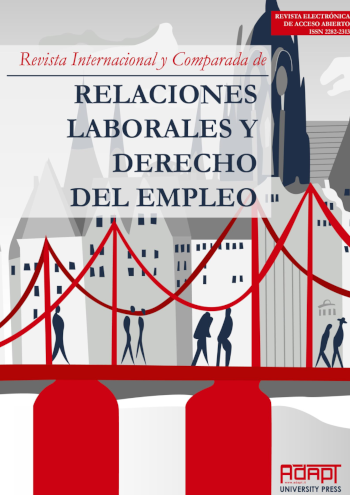Abstract
Las economías emergentes en Colombia desarrolladas por el sector informal, soportadas por plataformas virtuales, son la base del sostenimiento de muchas familias; tienda virtual (aplicaciones digitales intermediarias de productos y/o servicios a domicilio)propone una figura de socios a los trabajadores que prestan servicio de mensajería a domicilio sin garantizar su protección por el sistema general de seguridad social. Actualmente, no se existe regulación a estas aplicaciones de domicilios en Colombia. El objetivo es describir las condiciones de trabajo, salud y seguridad de tenderos virtuales en la ciudad de Bogotá, mediante un enfoque cualitativo y cuantitativo, de tipo exploratorio y descriptivo, bajo un estudio de caso con una muestra no probabilística de 8 trabajadores vinculados a tienda virtual, a quienes se les aplicó una entrevista semiestructurada y observación la actividad; se realizó el análisis de contenido con el software “Atlas.Ti” y su posterior valoración de riesgos con la metodología British Standard Institution (BSI). Se identifican peligros inherentes a factores intralaborales y extralaborales que vulneran las condiciones de accesibilidad y vinculación al trabajo mediante la aplicación virtual que regula la asignación de turnos y, por ende, el nivel salarial. Teniendo en cuenta estos resultados se recomienda construir propuestas de intervención de carácter interdisciplinario que reúna las disciplinas de Fisioterapia, Psicología e Ingenierías que permitan mejorar procesos laborales desde la plataforma hasta las condiciones de salud y políticas que garanticen la vinculación a la seguridad social, bienestar y reducción de riesgos.
Emerging economies in Colombia developed by the informal sector, supported by virtual platforms, are the foundation of the support of many families; virtual shop proposes a figure of partners to workers who provide home courier service without guaranteeing their protection by the general social security system. Currently, there is no regulation for these domicile applications in Colombia. The objective is to describe the working, health and safety conditions of virtual shopkeepers in the city of Bogotá, through a qualitative and quantitative approach, of an exploratory and descriptive type, under a case study with a non-probabilistic sample of 8 workers linked to the store virtual, to whom a semi-structured interview and observation of the activity was applied; Content analysis was performed with the ‘Atlas.Ti’ and its subsequent risk assessment with the British Standard Institution (BSI) methodology. Inherent hazards are identified to intra-labour and extra-labour factors that violate the accessibility and work-related conditions through the virtual application that regulates the allocation of shifts and, therefore, the salary level. Taking into account these results, it is recommended to build interdisciplinary intervention proposals that bring together the disciplines of Physiotherapy, Psychology, Engineering that allow to improve labour processes from the platform to health conditions and policies that guarantee the link to social security, welfare and risk reduction.

